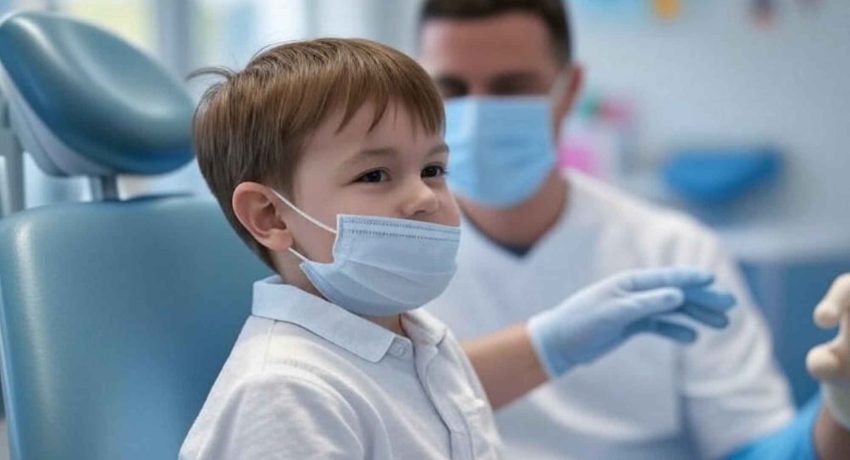As parents, we want our children to grow up with healthy, happy smiles. Yet, one of the most common challenges many families face is dental fear. For kids, even a simple dental check-up can feel overwhelming. The sound of tools, the unfamiliar smells, and the idea of sitting in a big chair while someone looks inside their mouth can easily spark anxiety. If you’ve ever had to comfort a nervous child before a dentist visit, you know it can be a stressful experience for both of you. The good news is that dental anxiety in children solutions exist, and with the right approach, visits to the dentist can become a positive, fear-free experience.
Understanding Dental Fear in Children
Dental fear isn’t something unusual or rare. In fact, studies show that many children experience anxiety when it comes to medical environments, especially the dentist’s office. For some kids, this fear stems from a lack of understanding about what will happen. Others may have heard stories from siblings, friends, or even parents that make them think the dentist is scary. And then there are children who may have had an uncomfortable first experience, which makes them reluctant to go back.
By recognizing that dental anxiety is normal and acknowledging your child’s feelings, you’ve already taken the first step toward helping them overcome it. What matters most is approaching the issue with patience, empathy, and strategies tailored to your child’s personality and comfort level.
Gentle Communication Makes a Big Difference
One of the most effective safe solutions for kids’ dental fear is clear, simple communication. Children often fear the unknown, so explaining what will happen in words they understand helps them feel more in control. For example, instead of saying, “The dentist will drill your tooth,” you could say, “The dentist has a special toothbrush that can clean away sugar bugs.” Shifting language to be more child-friendly makes the whole process less intimidating.
Role-playing at home can also be a fun way to ease worries. You can pretend to be the dentist and show them how to open wide while you “count” their teeth. This playful practice turns the idea of a dental visit into something familiar and even enjoyable.
Creating a Positive First Dental Visit
The first dental visit plays a huge role in shaping how children perceive dentistry. Pediatric dentists are trained to create child-friendly environments, but as parents, you can set the stage even before walking into the clinic. Choose a dental practice that specializes in children and has a welcoming, colorful waiting room. A space filled with toys, books, and friendly staff immediately sends the message that this is a safe place.
Avoid using dental visits as threats, such as saying, “If you don’t brush, the dentist will give you a shot.” Such phrases can build fear instead of trust. Instead, highlight the positive side of the visit by saying things like, “The dentist will help keep your teeth shiny and strong.”
Relaxation and Distraction Techniques
Another safe solution for dental fear is using relaxation and distraction methods during the visit. Many pediatric dentists allow children to watch cartoons, listen to music, or even hold a favorite stuffed toy while getting their teeth checked. These small comforts can go a long way in reducing anxiety.
Parents can also teach kids simple relaxation exercises before the appointment. Deep breathing, for example, can help calm nerves. Teaching your child to take slow, deep breaths when they feel scared gives them a practical tool they can use during stressful moments.
Parental Attitude and Support
Children are incredibly sensitive to their parents’ emotions. If you appear nervous or anxious about the dental visit, your child may mirror those feelings. Approaching the appointment with calm confidence can reassure your child that everything will be fine. Sometimes, letting the dentist take the lead while you step back helps too. Pediatric dentists are experts at building rapport with children, and allowing your child to bond with their dentist can help build long-term trust.
The Role of Preventive Care at Home
While dentist visits are essential, much of a child’s oral health depends on daily care at home. Teaching children good oral hygiene from an early age not only keeps their teeth healthy but also makes them more comfortable with the idea of dental care in general.
Choosing the best toothpaste for kids is an important part of this process. Children’s toothpaste should have the right fluoride content to strengthen enamel, but it should also be safe to swallow in small amounts since younger children may not fully master spitting. Toothpaste with mild flavors like strawberry or bubblegum often appeals more to kids compared to strong mint varieties, which they might find overwhelming. By turning brushing time into a fun routine with colorful toothbrushes and kid-friendly toothpaste, children develop a positive relationship with oral care that naturally eases dental fears.
Building Long-Term Confidence
Overcoming dental fear is not about one single visit or quick fix; it’s about building long-term confidence. Each positive experience adds to your child’s comfort level, making the next visit easier. Celebrate small successes, like when your child sits calmly in the chair or opens their mouth without hesitation. A reward system, such as stickers or extra playtime after the appointment, can encourage cooperation and create positive associations.
When Anxiety Persists
For some children, fear may remain strong even after using all these gentle solutions. In such cases, it’s worth talking with your pediatric dentist about additional approaches. Some dentists offer specialized behavior guidance techniques, and in certain cases, mild sedation options may be considered. However, these are typically reserved for situations where dental treatment is necessary and all other comfort methods haven’t worked.
The key is to remember that fear should never be dismissed or rushed. Patience and professional guidance can make all the difference in creating a safe, supportive environment for your child.
Final Thoughts
Helping children overcome dental fear is a journey that requires empathy, preparation, and consistency. By focusing on communication, positive reinforcement, and child-friendly dental practices, parents can turn what might feel like a stressful experience into an empowering one. With the right strategies and supportive care, dental anxiety in children solutions become achievable, paving the way for a lifetime of healthy smiles. And by making small choices at home, like selecting the best toothpaste for kids, parents can ensure their child not only has strong teeth but also a confident, fearless approach to dental health.











